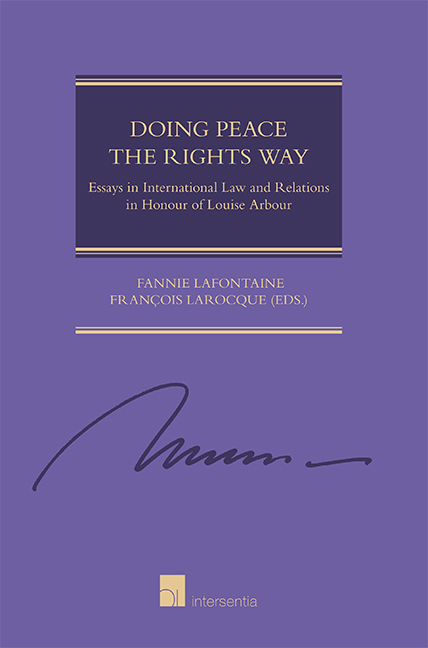Book contents
- Frontmatter
- Foreword
- Contents
- List of Contributors
- Introduction
- PART I OF FREEDOM AND EQUALITY
- PART II OF PEACE AND JUSTICE
- PART III OF WOMEN AND LEADERSHIP
- Leadership in the United Nations and the Challenge of Courage
- The World Bank as a Human Rights-Free Zone
- Come a Long Way and a Long Way to Go: UNSCR 1325 and Women's Participation in Peace-Making
- Why are Women Canada's Fastest-Growing Prison Population and Why Should We Care?
- Moving Beyond Facial Equality: Examining Canadian and French Niqab Bans
- Select Bibliography
- Appendix
- An Interview with the Honourable Madam Justice Louise Arbour
Come a Long Way and a Long Way to Go: UNSCR 1325 and Women's Participation in Peace-Making
from PART III - OF WOMEN AND LEADERSHIP
Published online by Cambridge University Press: 13 April 2019
- Frontmatter
- Foreword
- Contents
- List of Contributors
- Introduction
- PART I OF FREEDOM AND EQUALITY
- PART II OF PEACE AND JUSTICE
- PART III OF WOMEN AND LEADERSHIP
- Leadership in the United Nations and the Challenge of Courage
- The World Bank as a Human Rights-Free Zone
- Come a Long Way and a Long Way to Go: UNSCR 1325 and Women's Participation in Peace-Making
- Why are Women Canada's Fastest-Growing Prison Population and Why Should We Care?
- Moving Beyond Facial Equality: Examining Canadian and French Niqab Bans
- Select Bibliography
- Appendix
- An Interview with the Honourable Madam Justice Louise Arbour
Summary
To be powerful and influential, one can argue, requires not just representation but presence, and not just presence, but meaningful, empowered presence. In 2016, there were only ten women serving as heads of states and nine serving as heads of government, and women held only 22 % of seats in parliaments around the world. Despite huge effort and promotion, women candidates for the top jobs at the United Nations (UN) and the US Government failed to prevail. Peace processes, in particular, as they “provide key opportunities for major reforms that transform institutions, structures, and relationships in societies affected by conflict or crises,” are instrumental for women's empowerment and for their consideration in the construction of their post-conflict society. According to a study by UN Women based on 31 major peace processes occurring between 1992 and 2011, women represented 2.4 % of chief mediators (although the UN itself has never appointed a woman as chief mediator), 4 % of peace agreement signatories, and 9 % of negotiators in formal peace processes. Most of the time, this low representation of women in peace negotiations is the result of passive – as opposed to deliberate – exclusion, but as some feminist writers have clearly underlined, gender-neutrality often corresponds to gender-blindness. Traditionally, women are very much involved in informal peace negotiations at the grassroots level and within civil society initiatives, and in particular in disarmament processes; this contribution is now widely documented and recognized. But as is well known, women's participation in formal peace negotiations remains very marginal. Moreover, even when women are included, their viewpoints are often sidelined, as they are perceived to lack relevant qualifications, credibility or simply power.
Many hypotheses have been proposed to explain the dramatic underrepresentation of women in formal peace processes, starting with a lack of women in the traditional institutional “pipelines” to mediation and negotiation. For example, women are still a minority within governments and armies, and in the military and political wings of armed groups, and yet the belligerents ‘ representatives are generally perceived to be the most crucial actors in peacemaking – at least in the prevailing concept of peace-making – to the expense of other groups, mostly civil society.
- Type
- Chapter
- Information
- Doing Peace the Rights WayEssays in International Law and Relations in Honour of Louise Arbour, pp. 401 - 422Publisher: IntersentiaPrint publication year: 2019



